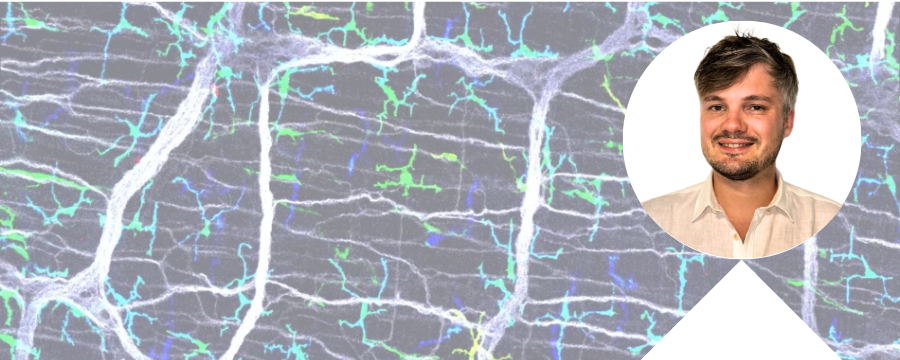Meet Sebastiaan De Schepper: (dis)connecting the gut and brain in Parkinson's disease
Seppe joins the VIB-UAntwerp Center for Molecular Neurology as a new PI
Sebastiaan “Seppe” De Schepper has a knack for stepping outside of his comfort zone. Originally a biomedical scientist, he transitioned into gut research before taking a bold leap into neuroscience. Now, as a new group leader at the VIB-UAntwerp Center for Molecular Neurology, he’s combining these fields to explore a fascinating frontier: the gut-brain axis and its role in Parkinson’s disease.
“I want to figure out how the body’s immune system impacts the brain,” Seppe explains. “For a long time, people thought of the brain as this separate entity, secluded from the rest of the body. But now we know everything is connected—and the gut plays a much bigger role than we imagined.”
In Parkinson’s disease (PD), this connection is especially striking. Many patients experience gut problems many years before classic motor symptoms like tremors or stiffness begin. “We actually found a role for immune cells in the gastrointestinal tract, which impact the disease,” he says. His postdoc work, which will serve as a foundation for his lab’s work, focused on macrophages—immune cells responsible for maintaining proper gut function. But in Parkinson’s, these cells appear to become dysfunctional.
“These cells are supposed to support the neurons in the gut,” he explains, “but when they encounter alpha-synuclein—a protein linked to Parkinson’s—their whole behavior changes. They try to remove this protein, recruit other immune cells, and it turns into this spiral that could help trigger the disease.”

New lab, big dreams
Based on this knowledge, Seppe’s new lab will investigate these interactions between the gut’s immune cells in more detail. “The immune system is incredibly complex,” he says. “We need to understand the different roles of macrophages and how they attract other immune cells, like T-cells, and how those cells, in turn, travel to the brain.”
The goal? “If we can modulate the immune response, we might delay disease onset, giving people more years of quality life,” Seppe says. “On top of that, I’m excited about identifying biomarkers in immune cells that could predict Parkinson’s before symptoms arise.”
Parkinson’s is his starting point, but he’s eager to see if the same principles apply to other neurological disorders that involve the gut-brain axis, such as autism or stroke.
For now, Seppe is building his dream team: “I’m currently recruiting a postdoc, a PhD student, and a technician.” He’ll also act as a second postdoc in the lab himself. “Every PI advised me to stay in the lab as much as possible, although I fear paperwork might win sometimes,” he jokes.
A neuron (blue) interacting with immune cells (macrophages (yellow) and T cells (pink)) in the gut:
Coming home
Seppe’s scientific career has taken him across the globe—from Leuven to Singapore to the UK Dementia Research Institute, one of the world’s top neuroscience hubs. But Belgium was always home.
“I knew my time abroad was temporary, part of my training,” he shares. “If you’re doing life sciences research in Belgium, working at VIB is the dream. My ultimate goal was always to contribute to VIB and the vibrant research community in Belgium. After six years away, it felt like the right time to come back and be closer to friends and family. When the opportunity at VIB-UAntwerp opened up, it felt like everything aligned—professionally and personally.”
Seppe found his perfect fit at the Center for Molecular Neurology, where his expertise in the gut-brain axis complements the center’s growing focus on neuro-immunology. He’s already mapping out exciting partnerships. “Renzo [Mancuso] and I want to explore how macrophages in the gut compare to microglia in the brain—they’re surprisingly similar,” he explains. He also sees opportunities to team up with Emanuela Pasciuto on T-cells and autism and with Roos Vandenbroucke at the VIB-UGent Center for Inflammation Research on overlapping research interests.
He’s also eager to partner with patient organizations like the Vlaamse Parkinson Liga and leverage resources like the Antwerp Brain Bank. “Our work is only meaningful if it translates to real benefits for patients,” Seppe says.
Football, beers, and airplanes
Outside of research, Seppe’s passions are delightfully down-to-earth. He loves watching football, tasting beers (Westmalle Tripel is a favorite), and spotting airplanes.
“I know it’s nerdy,” he says with a grin, “but I love going to the airport early just to watch planes take off. In London, there was this amazing airport museum nearby—it was heaven!”
Step outside your comfort zone
For young researchers, Seppe has the following advice: “Step out of your comfort zone. Challenge yourself and do something completely different. If it fails, that doesn’t mean you didn’t succeed! If things aren’t going well, don’t hesitate to change. And never be afraid to ask for help.”
Living by this advice has brought Seppe from Antwerp to global neuroscience hubs and back. We’re looking forward to how his work will contribute to a future where Parkinson’s and other diseases might strike later—or not at all.
Welcome to VIB, Seppe!
Want to be kept up-to-date on our biotechnological news and stories? Join our community and subscribe to our bi-monthly newsletter.
.png)


